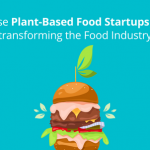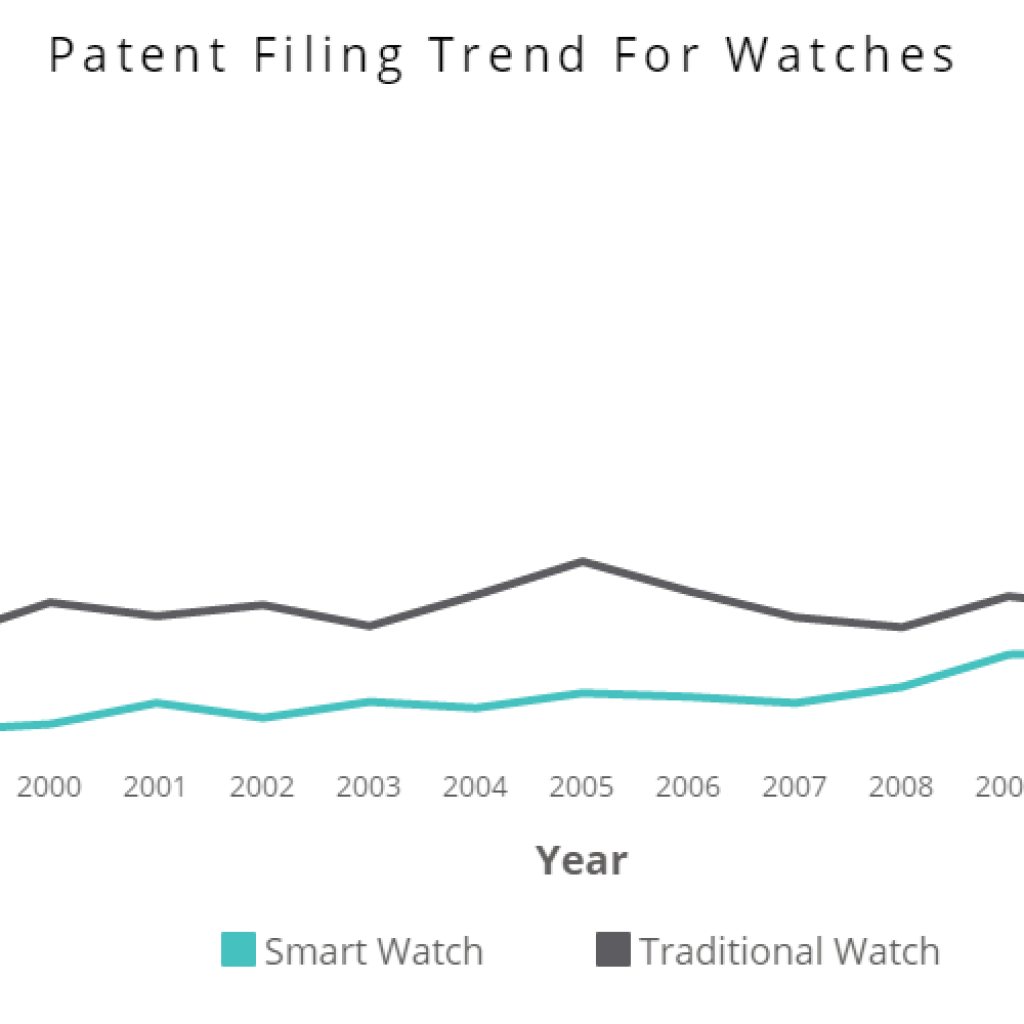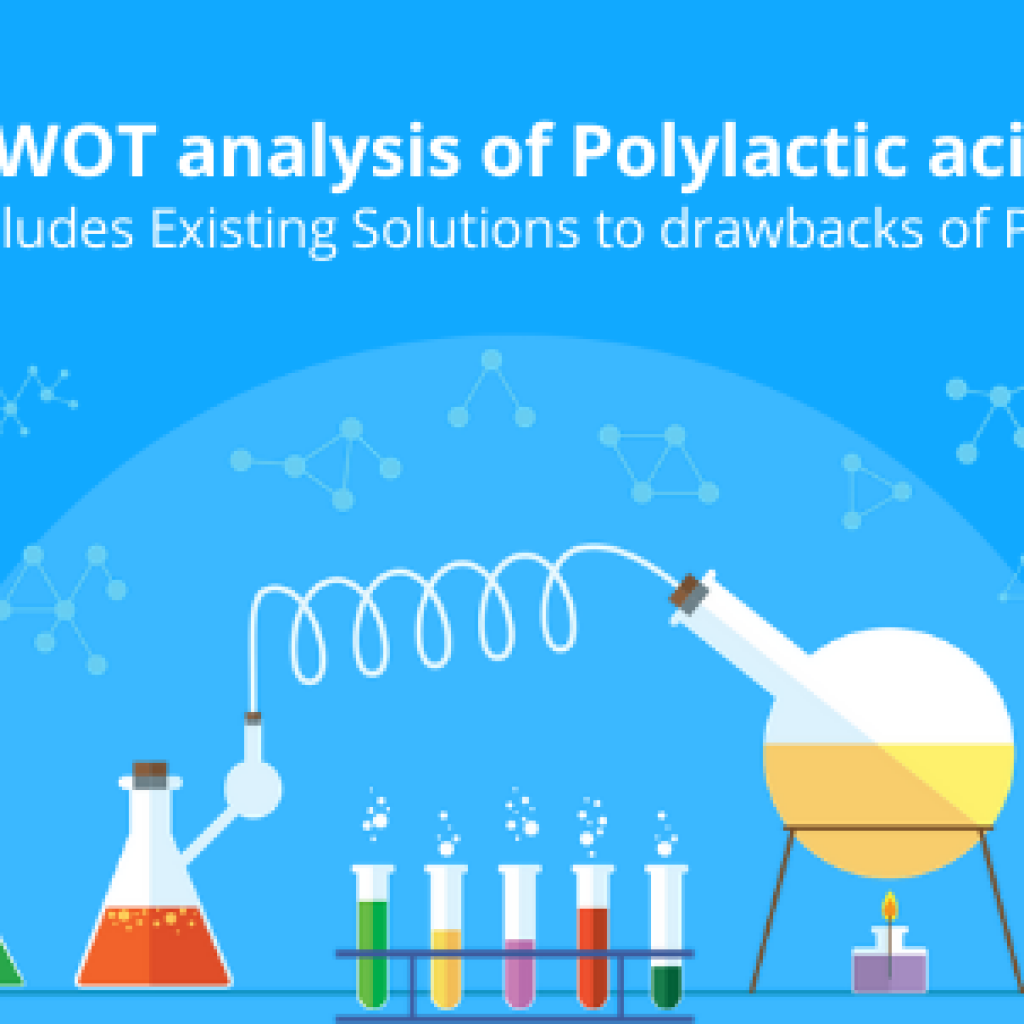Shinsegae Food Co. Ltd. researchers have discovered how to use AI to develop mutant microbial strains that produce higher-protein meat alternatives. Others, like Air Protein Inc., have created methods to leverage CO2 in feedstock to increase protein yields.
In addition to yield optimization, new texturization methods have emerged to enhance the mouthfeel of vegan meat foods. These methods use hydrocolloid gels that freeze in a controlled direction to mimic the texture of meat. Likewise, new engineered proteins are being developed to replace egg proteins, offering the same texture and performance in baking.
This article contains the details above and highlights from GreyB’s comprehensive report on innovation trends shaping the alternative protein industry in 2025.
Fill out the form below to get the complete report into your inbox.
Trend 1: Upstream Processing – Innovations in Protein Discovery and Production
The traditional approach to protein discovery is unnecessarily slow. With resource allocation and competitive advantage constantly in mind, relying on iterative processes like recombinant protein production is no longer viable. The real bottleneck isn’t just the experimental phase but the need for continuous optimization at every stage. There’s an immediate need for faster, more precise approaches.
Prediction models rapidly offer data-driven insights into the most promising protein sequences with the desired functional properties from the outset.
Key Innovations in Upstream Processing Trends for Alternative Protein Discovery
Shiru’s innovative platform uses machine learning to design animal protein alternatives
| Innovation | Shiru uses AI and ML to discover proteins. |
| Market Potential | Meets the demand for sustainable, nutritious food products. |
| Application | Shiru develops ingredients that are optimized for commercial food products. |
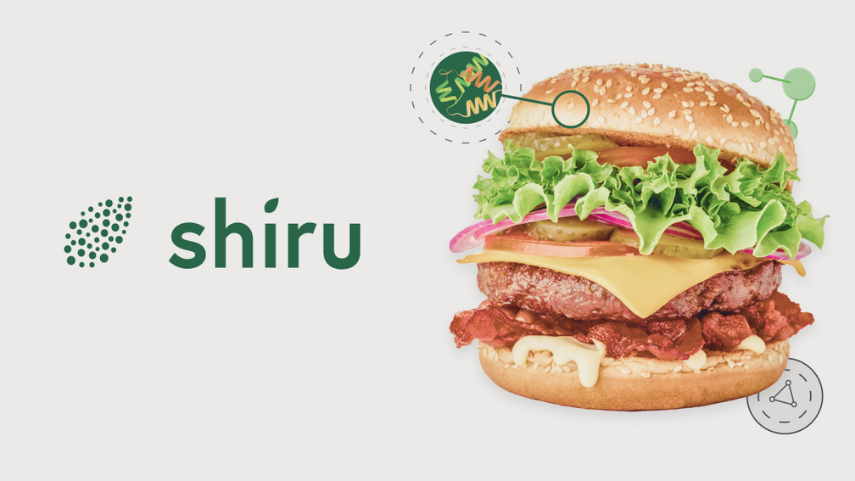
Shiru Inc. is addressing key challenges in protein development by pioneering the trends of applying artificial intelligence to alternative protein design.
Their technology sifts through large amounts of data through predictive modeling to find proteins with the right taste, texture, and nutritional benefits. This approach highlights a growing trend toward using AI to bypass traditional trial-and-error methods, making the process faster and more focused with data-driven exploration of functional protein properties. Shiru’s method represents a shift in how researchers find new protein solutions.
Key Highlights
- Shiru’s Flourish platform, with a database of over 33 million protein sequences, allows for rapid discovery of functional proteins from nature.
- The Expressor tool predicts protein expression potential in microbial systems, optimizing production scalability.
- The technology targets multiple industries, including food, cosmetics, and pharmaceuticals.
- In 2022, Shiru was awarded a patent for its protein discovery platform, which integrates machine learning with lab testing to develop functional food ingredients.
- Shiru has partnered with industry leaders like CP Kelco, Puratos, and Ajinomoto to commercialize its discoveries.
- Shiru developed OleoPro, a plant-based structured fat alternative to animal and tropical fats, reflecting their commitment to creating sustainable food solutions.
Climax Foods utilizes algorithms and predictive modeling to identify proteins with animal-protein functional properties.
| Innovation | Climax Foods uses AI algorithms for protein selection |
| Market Potential | Addresses the growing demand for plant-based proteins. |
| Application | Climax Foods proteins replace animal-based ingredients. |
Climax Foods Inc. leverages AI and predictive modeling to identify plant proteins that effectively mimic animal-derived proteins in food products. Their technology analyzes protein composition, structure, and functionality to find optimal plant-based alternatives for caseins, collagen, myosin, and other animal proteins. This data-driven approach accelerates the development of convincing plant-based substitutes for dairy, meat, and leather products.
Key highlights:
- The company has partnered strategically with Danone to develop innovative plant-based cheese products.
- Climax Foods successfully debuted Climax Reserve, a gourmet plant-based cheese line, showcasing its technology’s commercial viability.
- The company secured $50 million in Series B funding, led by Valor Equity Partners and Prelude Ventures, demonstrating strong investor confidence.
- Climax Foods has attracted investment from high-profile figures like Bill Gates and Mark Cuban, further validating their technological approach.

A new, high-protein mutant strain for the alternative meat sector
| Innovation | Shinsegae Food and Chung-Ang University developed a high-protein mutant strain. |
| Market Potential | The mutant strain targets the growing demand for high-protein foods. |
| Application | The strain is used in microbial preparations, foods, and animal feed. |
In collaboration with Chung-Ang University, Shinsegae Food Co., Ltd has developed a novel high-protein Saccharomyces cerevisiae mutant strain (SKSC34709-180) using UV genetic mutations.
This strain contains 28% more protein than its parent strain, making it a promising candidate for producing protein-rich microbial preparations, foods, and animal feed. The innovation addresses the growing demand for sustainable, high-quality protein sources in human and animal nutrition.
Initial animal feeding trials have shown promising results regarding the nutritional value and digestibility of the high-protein yeast.
Key highlights:
- The collaboration between Shinsegae Food and Chung-Ang University demonstrates successful industry-academia partnerships in biotechnology.
- UV mutagenesis showcases a non-GMO approach to strain improvement, potentially easing regulatory approval processes.
- The company has initiated pilot-scale production of the high-protein yeast for further testing and product development.
- The innovation aligns with South Korea’s push for food tech advancements and sustainable protein solutions.
Helaina Inc. is enhancing the production of mammalian proteins
| Innovation | Helaina Inc. created signal peptides that help produce proteins outside of cells more efficiently. |
| Market Potential | This technology makes important proteins like those in human milk. |
| Application | These peptides improve the production of various mammalian proteins, including human milk proteins. |

Helaina Inc. developed secretion signal peptides that improve the extracellular production of proteins. These signal peptides help enhance the production of various mammalian proteins, including human milk proteins like IgA and lactoferrin.
Key highlights:
- The technology combines elements from yeast types, P. pastoris and S. cerevisiae, to optimize protein secretion.
- Helaina has raised over $83 million in funding, reflecting strong investor confidence.
- The company has partnered with Mitsubishi International Food Ingredients, Inc. to commercialize its products.
- Helaina’s technology is set to debut in consumer products from brands like Kroma Wellness and Levelle Nutrition.
Trend 2: Innovations in Bioprocess Optimization
Cultivated meat production requires growing cells in a lab setting, which demands appropriate growth conditions. The major challenge is achieving the desired texture and structure of muscle fibers. One solution to overcome this challenge is the introduction of scaffolds into the cellular growth environment, which promotes cell adherence, communication, and overall structural integrity.
Key Innovations in Bioprocess Optimization
Edible plant fat-based scaffold that mimics meat texture
| Innovation | Plant fat-based scaffold for cell-based meat. |
| Market Potential | Boosts alternative meat industry scalability. |
| Application | Grows enhanced, cell-based meat products. |
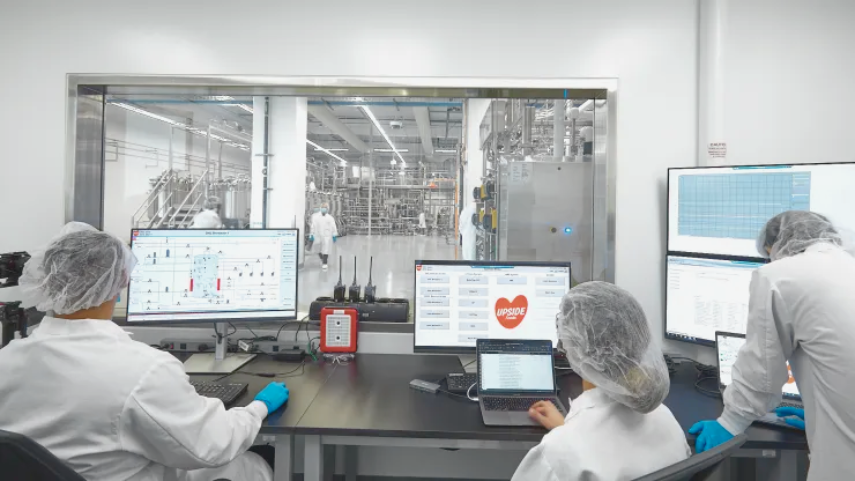
Upside Foods Inc. uses animal cell culture technology to take living cells from chickens and grow the cells in a controlled environment to create meat. They were the first to get FDA regulatory approval for cultivated meat in the U.S.
The company has an innovative solution for a plant fat-based scaffold designed to grow cell-based meat products. Unlike traditional scaffolds, these are edible, made from plant-based fats, and partially or fully melted without cell damage.
Key highlights:
- This innovation includes additional components to enhance cell attachment and growth, ensuring stability even in hot and sterile conditions.
- Upside Foods has secured significant investments from Bill Gates, John Doerr, Kimbal & Christiana Musk, among others. This reflects strong market confidence in its innovative approach.
Air Protein Inc. is utilizing CO2 to develop a high-protein meat substitute
| Innovation | Air Protein Inc. uses microorganisms to convert CO2 into protein hydrolysate. |
| Market Potential | The technology targets sustainable food production, appealing to eco-conscious consumers |
| Application | Protein hydrolysate is used to cultivate animal cells and create meat-like products. |

Air Protein Inc.’s recent solution uses CO2 as feedstock to develop a high-protein meat substitute. This alternative protein-rich food resembles animal meat’s texture, flavor, and functional properties.
By utilizing CO2 as a feedstock, the innovation offers a potentially sustainable and environmentally friendly approach to produce protein-rich food compositions.
Key highlights:
- Air Protein has secured over 50 patents for its technology, showcasing its strong intellectual property portfolio.
- The company has formed notable partnerships with Kiverdi to scale production.
- The company has raised over $107 million from prominent investors, such as ADM Ventures, Barclays, and Google Ventures (GV).
Trend 3: Innovations in End product formulations for meat, dairy, and egg analogues
There has been a surge in the development of plant-based meat. Still, the current alternatives cannot often closely mimic real meat’s taste, appearance, and nutritional value. The solution lies in a protein called Myoglobin, which is a heme-containing globular protein structurally akin to a human hemoglobin subunit.
In recent years, companies have been targeting myoglobin to simulate real meat color and enhance the authentic flavor of these alternatives. This has resulted in the need for an eco-friendly, cost-effective microbial synthesis method for the large-scale production of myoglobin.
Key Innovations in meat and dairy products formulations
Creating indistinguishable meat alternatives using Myoglobin
| Innovation | Paleo BV uses precision fermentation to produce GMO-free heme proteins. |
| Market Potential | Targets plant-based and cell-based meat markets for eco-conscious consumers. |
| Application | Heme proteins enhance flavor, color, and texture in meat substitutes. |
Paleo BV has invented a meat substitute containing animal myoglobin protein, mimicking meat’s flavor, color, texture, and nutritional qualities. This protein is used in various formulations for cell-based or plant-based meats, soups, snacks, etc., with the primary objective of mimicking meat qualities.
Key Highlights:
- Paleo BV has secured multiple patents for its innovative use of animal myoglobin in meat substitutes.
- The company has partnered with Motif FoodWorks to enhance production and distribution capabilities.
- Investors have shown strong interest. Paleo raised €12 million in a recent funding round to scale its production and expand its market presence.
Recommended: 5 Startups Leading the Cell-based Meat Industry in 2025
Improving texture in plant-based proteins Using starch for meat analogue
| Innovation | Ingredion and partners use starch to enhance plant-based protein texture. |
| Market Potential | Targets growing plant-based food market, appealing to health-conscious consumers. |
| Application | Improves mouthfeel and structure in plant-based meat analogs. |
Ingredion Germany GmbH, Wageningen Universiteit, and Stichting Wageningen Research have found a way to enhance the texture of plant-based protein material. The innovation uses starch to improve mouthfeel and fibrous structure in analogs without compromising their fibrousness. The composition comprises plant-based protein and starch, among other elements.
Key highlights:
- The company has expanded its partnership with Univar Solutions to distribute ingredients in Europe, including Germany, Italy, and Switzerland. This collaboration focuses on providing modified, clean-label starches and plant-based proteins.
- Investors have shown strong interest, with Ingredion raising $200 million to expand its production capabilities.
- Ingredion’s new manufacturing facility in Vanscoy, Saskatchewan, supports the increased production of these innovative products.
Directional freezing and protein infusion for creating plant-based meat analogues
| Innovation | New School Foods uses directional freezing to create meat-like hydrocolloid gels. |
| Market Potential | Targets plant-based seafood market, appealing to eco-conscious consumers. |
| Application | Enhances texture and muscle fiber mimicry in plant-based meat analogues. |
New School Foods Inc.’s innovation uses a two-step process of freezing a hydrocolloid gel to create meat analogues. The first step involves directionally freezing the hydrocolloid gel, which helps mimic the muscle fibers found in meat or fish. In the second step, an ingestible soluble heat-gelling protein replaces the aligned ice crystals through immersion in a protein solution.
Key highlights:
- Their cold-based processing technology creates raw fillets that cook like conventional fish.
- New School Foods has partnered with global investors like Lever VC, Blue Horizon, and Hatch.
- They raised $12 million in seed funding and $6 million in a Seed Extension round. Using this, the company has opened a 28,000 sq. ft. pilot production facility in Toronto.
- They are set to launch their plant-based whole-cut salmon in the U.S. and Canada.
Recommended: 5 Startups Leading Plant-Based Meat Alternative Industry in 2025
Dairy-free cheese analogs crafted with recombinant alpha casein protein
| Innovation | New Culture uses recombinant alpha casein proteins to mimic dairy cheese. |
| Market Potential | Targets vegan and lactose-intolerant consumers seeking dairy-like cheese. |
| Application | Enhances flavor, texture, and nutrition in animal-free cheese products. |
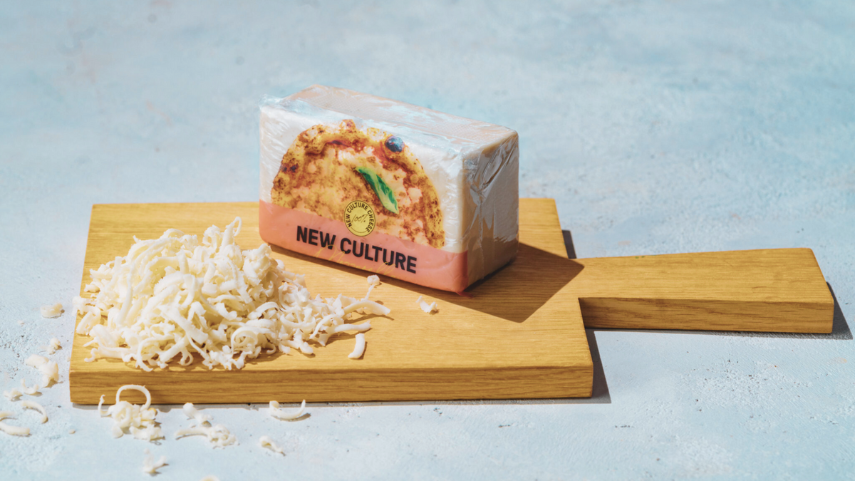
New Culture Inc. has developed a cheese analogue using recombinant proteins that mimic dairy qualities like stretch, melt, and texture. They use single variants of alpha casein proteins without phosphorylation to replicate traditional cheese’s functionality, nutrition, and taste. Adding plant-derived oils, starch, sugars, salts, and flavorings enhances the cheese analog’s properties and flavor.
Key highlights:
- New Culture has partnered with Kraft Heinz, ADM, and CJ CheilJedang. They raised $25 million in Series A funding.
- They use precision fermentation to produce casein without animal inputs.
- They have scaled their production to make enough vegan mozzarella for 25,000 pizzas in a single run. The company debuted its animal-free mozzarella in Los Angeles, New York City, and San Francisco with positive customer perception.
Recombinant egg proteins as egg replacers
| Innovation | Recombinant egg proteins mimic egg whites’ properties using non-animal sources. |
| Market Potential | Meets the growing demand for sustainable, animal-free protein alternatives. |
| Application | Used in food products for gelling, foaming, and texturizing. |

Every Co uses recombinant egg proteins as non-animal-based protein sources in consumable food products. The composition includes recombinant ovalbumin proteins. The resulting characteristics resemble egg whites, including gelling, foaming, whipping, fluffing, browning, thickening, texturizing, and cohesiveness.
Key highlights:
- Every Co has partnered with Ingredion to integrate recombinant egg proteins into commercial food products.
- The company raised $50 million in Series B funding led by Blue Horizon Ventures.
- Every Co’s technology reduces the environmental impact compared to traditional egg production, aligning with sustainability trends.
- The company is part of the Good Food Institute’s network, promoting alternative proteins globally.
Recommended: How Precision Fermentation Companies are Changing the Dairy Industry
Trend 4: Improving texture and nutritional benefits
Demand for affordable colloidal foods mimicking traditional options without allergenic or animal-derived ingredients is rising, valuing this market at over $50 billion in 2024 alone. Researchers have discovered newer, vegan food formulations with an enhanced shelf life, providing nutrition without triggering allergies.
Key Innovations and Trends in Alternative Protein Texture & Nutrition Enhancement
Filamentous fungal for nutritional and textural enhancement of food products
| Innovation | Filamentous fungal particles stabilize colloids and enhance nutritional profiles. |
| Market Potential | Meets the rising demand for affordable, nutritious, and allergen-free food products. |
| Application | Used in ice cream and mayonnaise as protein supplements or replacements. |
The Fynder Group Inc. makes a colloidal composition with filamentous fungal particles. These particles replace or supplement protein in foods like ice cream and mayonnaise. The composition includes gas, carbohydrates, and water, enhancing texture and creaminess. This innovation makes food products more affordable, nutritious, and suitable for various dietary needs while ensuring stability and a longer shelf life.
Key highlights:
- The Fynder Group Inc. secured $30 million in Series A funding led by Seventure Partners.
- Their fungal protein is featured in products by General Mills, indicating strong commercial interest.
- The Fynder Group Inc. is part of the EIT Food network, promoting innovation in the food industry.
Vegan milk production using ultrasonic wave technology for improved stability and nutritional value
| Innovation | Enhancing plant milk’s stability, sensory properties, and nutritional value. |
| Market Potential | Meets the increasing demand for allergen-free, lactose-free, and nutritious milk alternatives |
| Application | Used in plant milk products for improved stability and sensory appeal. |
Yildiz Technical University and Bypro Functional Food And Biotechnology Joint Stock Company have developed a method to produce plant milk using ultrasonic sound waves. This technique reduces particle size, enhances stability, and prevents separation. The result is a plant milk with improved texture, sensory properties, and nutritional value, suitable for those with allergies or dietary preferences. This method avoids additives like antibiotics, hormones, and GMOs.
Future Outlook for Alternative Protein Trends
The global alternative proteins market was valued at USD 25.7 billion in 2022 and will reach USD 81.9 billion by 2030, exhibiting a CAGR of 15.6% in the next five years.
There are still challenges to overcome. Regulatory hurdles, consumer price sensitivity, and competition from traditional agriculture are all factors to consider. However, the overall outlook for alternative proteins is positive, with the potential to revolutionize the global food system.
Fill out the form below to download the complete report on Alternative Protein Trends for 2025.
Authored by: Vinish, Ritu, and Megha, Patent Intelligence
Edited by: Hemanth Shenoy, Market Research


